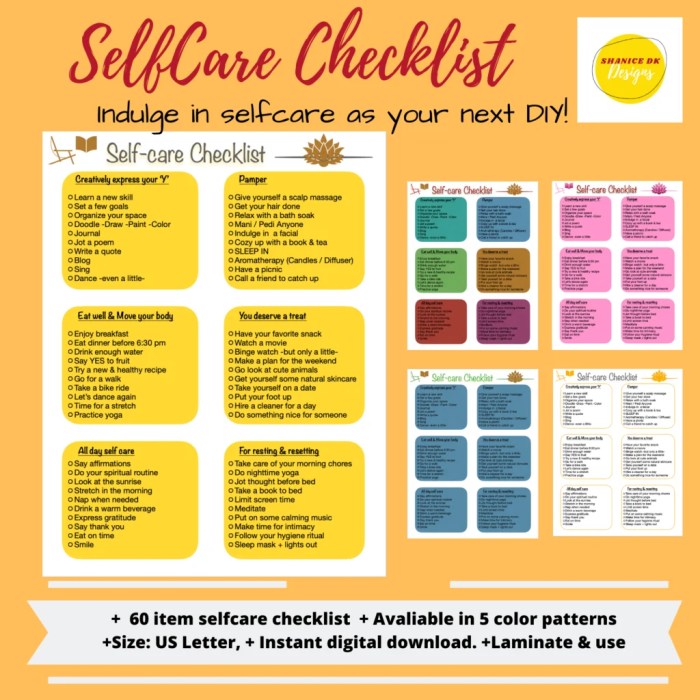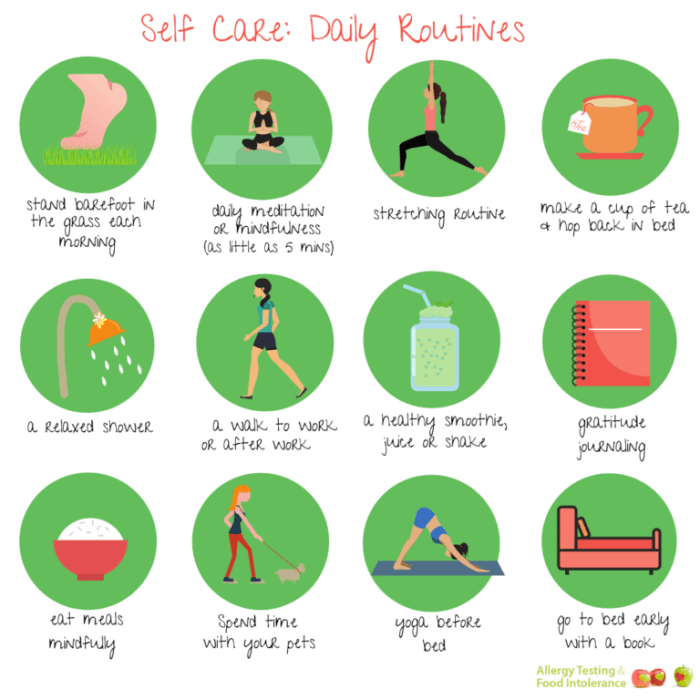Self-Care Routine Ideas bring a fresh perspective on boosting your overall well-being through simple yet effective practices. From physical to emotional and social self-care, discover ways to prioritize yourself in the midst of daily life.
Explore the benefits of establishing a consistent self-care routine and how it can positively impact your mental health. Whether you’re a morning person or night owl, there are self-care activities tailored to fit any part of your day.
Self-Care Routine Ideas

Taking care of yourself is essential for overall well-being. Here are some self-care practices you can incorporate into your routine to improve your mental health and overall quality of life.
Five Unique Self-Care Practices
- 1. Mindful Meditation: Taking a few minutes each day to practice mindfulness can help reduce stress and increase self-awareness.
- 2. Journaling: Writing down your thoughts and feelings can be a therapeutic way to process emotions and gain clarity.
- 3. Physical Exercise: Engaging in regular physical activity not only benefits your body but also releases endorphins that improve mood.
- 4. Digital Detox: Unplugging from technology for a set period allows you to focus on the present moment and reduce screen-related stress.
- 5. Creative Expression: Whether through art, music, or dance, expressing yourself creatively can be a cathartic outlet for emotions.
Importance of Consistent Self-Care Routine
Self-care routines provide structure and predictability in our lives, helping us manage stress more effectively and maintain a sense of balance. By prioritizing self-care, we demonstrate self-love and build resilience to cope with life’s challenges.
How Self-Care Routines Improve Mental Health
Consistent self-care practices promote emotional regulation, reduce anxiety, and increase feelings of self-worth. By nurturing our physical, emotional, and mental well-being, we create a foundation for better mental health outcomes.
Self-Care Activities for Different Times of the Day
- Morning: Start your day with a healthy breakfast, practice yoga or stretching, and set intentions for the day ahead.
- Afternoon: Take a short walk outdoors, listen to calming music, or enjoy a nutritious snack to recharge midday.
- Evening: Wind down with a warm bath, read a book, practice deep breathing exercises, or reflect on your day before bedtime.
Physical Self-Care
Physical self-care plays a crucial role in maintaining overall well-being. It involves taking care of your body through various activities that promote physical health and vitality.
Five Physical Self-Care Activities
- 1. Regular exercise: Engaging in physical activities like walking, jogging, yoga, or dancing can boost endorphins and improve mood.
- 2. Adequate sleep: Ensuring you get enough rest each night is essential for physical and mental rejuvenation.
- 3. Balanced diet: Eating nutritious foods rich in vitamins, minerals, and antioxidants supports overall health and energy levels.
- 4. Hydration: Drinking enough water throughout the day helps maintain proper bodily functions and promotes radiant skin.
- 5. Self-care rituals: Incorporating practices like skincare routines, massages, or baths can help relax the body and mind.
Regular Exercise as Self-Care
Regular exercise not only improves physical health but also enhances mental well-being. It helps reduce stress, anxiety, and depression while boosting self-esteem and confidence. Exercise releases endorphins, the body’s natural mood elevators, promoting a sense of happiness and relaxation.
Creating a Personalized Physical Self-Care Plan
Listen to your body’s needs and preferences to tailor a physical self-care plan that works best for you.
Start by setting realistic goals and incorporating activities you enjoy. Mix and match different forms of exercise, such as cardio, strength training, and flexibility exercises, to keep your routine varied and engaging. Schedule regular rest days to allow your body to recover and prevent burnout. Remember to stay hydrated, eat nourishing foods, and prioritize quality sleep to support your physical well-being.
Emotional Self-Care

Emotional self-care involves taking care of your emotional well-being to maintain a healthy balance in life. It is essential for overall mental health and can help you cope with stress and challenges more effectively.
Journaling for Emotional Well-Being
Journaling is a powerful tool for processing emotions and thoughts. It allows you to express yourself freely, reflect on your experiences, and gain insights into your feelings. By writing down your thoughts, you can release pent-up emotions and improve self-awareness, leading to a greater sense of clarity and emotional well-being.
Self-Compassion in Emotional Self-Care
Self-compassion involves treating yourself with kindness, understanding, and acceptance, especially during difficult times. By practicing self-compassion, you can cultivate a positive relationship with yourself, build resilience, and enhance your emotional well-being. Remember to be gentle with yourself and practice self-care without judgment.
Managing Stress and Anxiety through Emotional Self-Care, Self-Care Routine Ideas
– Engage in relaxation techniques such as deep breathing, meditation, or yoga to calm your mind and body.
– Connect with supportive friends or family members to share your feelings and receive emotional support.
– Set boundaries to protect your emotional energy and prioritize self-care activities that bring you joy.
– Seek professional help if you’re struggling with overwhelming stress or anxiety to develop coping strategies and receive specialized support.
Social Self-Care
Social self-care involves nurturing relationships with others and maintaining a healthy social life to improve mental well-being.
Benefits of Spending Quality Time with Loved Ones
Spending quality time with loved ones can have a positive impact on mental health by reducing stress, providing emotional support, and increasing feelings of belonging and connection.
- Engaging in meaningful conversations with family and friends
- Sharing meals together
- Participating in group activities or hobbies
- Attending social events or gatherings
Incorporating Social Self-Care into Daily Routines
It is important to prioritize social interactions in daily routines to maintain a healthy balance between personal time and time spent with others.
- Schedule regular phone calls or video chats with loved ones
- Plan social outings or gatherings with friends or family members
- Join clubs, classes, or groups with shared interests
- Volunteer for community events or organizations
Examples of Social Self-Care Activities
Engaging in activities that involve social interactions can provide a sense of fulfillment and connection with others.
- Attending a group fitness class
- Organizing a game night with friends
- Hosting a dinner party or potluck
- Joining a book club or discussion group
